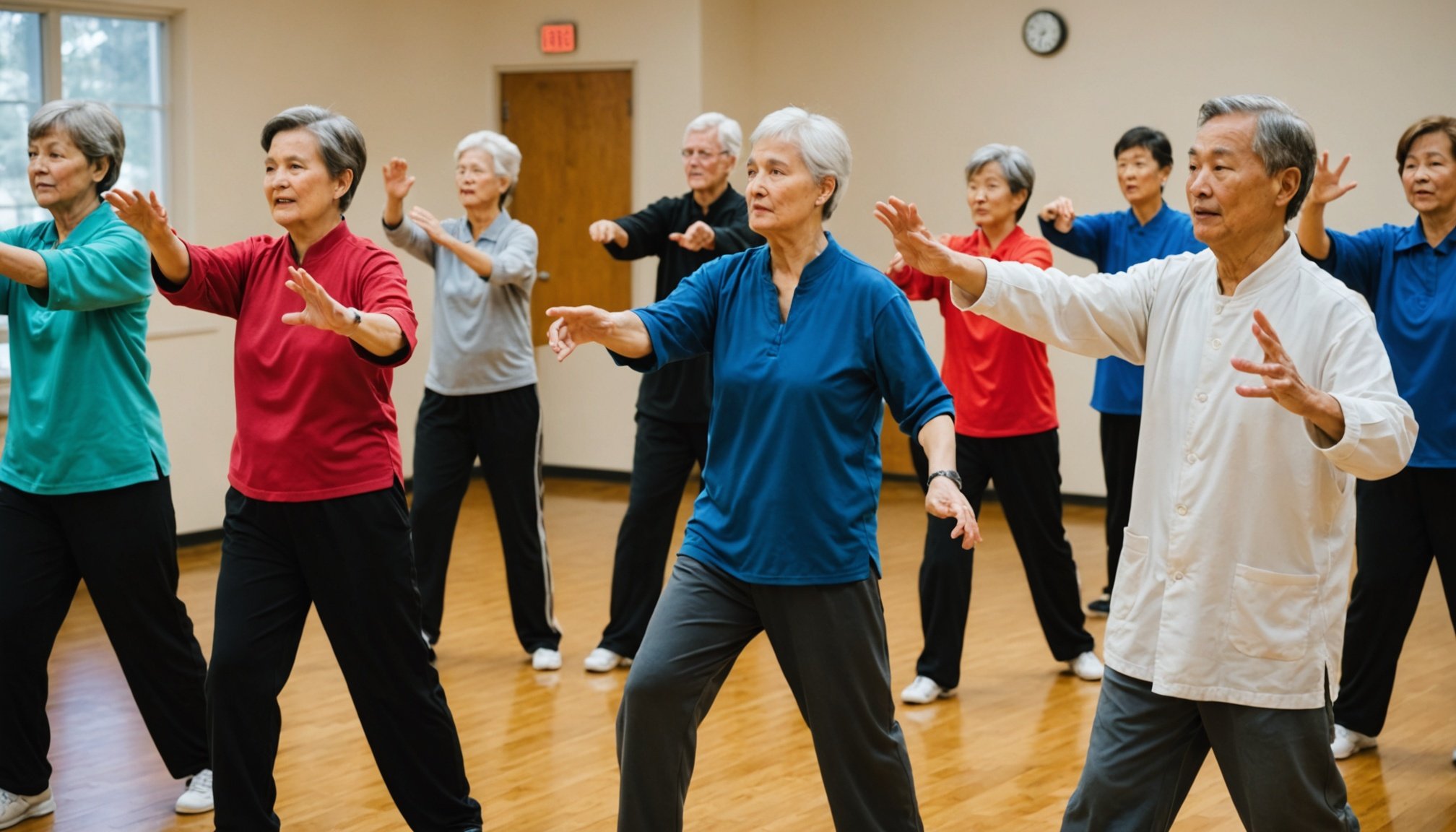Unlocking Better Mental Health: The Impact of Regular Tai Chi Practice on Seniors to Tai Chi and Its Benefits
Tai Chi, an ancient Chinese martial art, has evolved into a low-impact, slow-moving exercise that is increasingly recognized for its numerous health benefits, particularly for seniors. This practice combines elements of meditation, deep breathing, and physical movement, making it an ideal activity for enhancing both physical and mental health. In this article, we will delve into the specific ways in which regular Tai Chi practice can improve the mental health and overall well-being of seniors.
Physical Activity and Cognitive Function
One of the most significant benefits of Tai Chi for seniors is its impact on cognitive function. Regular physical activity, such as Tai Chi, has been shown to improve cognitive health by enhancing blood flow to the brain, delivering essential oxygen and nutrients that support brain health[1][4].
Have you seen this : Navigating Telehealth: The Benefits and Drawbacks for Chronic Respiratory Disease Management
Key Cognitive Benefits
- Improved Memory and Concentration: Tai Chi involves a series of movements that require concentration and memory, which can help improve these cognitive functions.
- Reduced Risk of Dementia: Studies indicate that moderate to high levels of physical activity, including Tai Chi, can lower the risk of developing cognitive impairment and dementia by up to 42%[4].
- Enhanced Synaptic Connections: The mental stimulation provided by Tai Chi can enhance synaptic connections, making the brain more resilient to aging-related changes[1].
Emotional Well-being and Stress Reduction
Tai Chi is not just a physical exercise but also a mental and emotional one. It incorporates deep breathing techniques and meditation, which are crucial for reducing stress and enhancing emotional well-being.
How Tai Chi Reduces Stress
- Release of Endorphins: Physical activity in Tai Chi stimulates the release of endorphins, which are natural mood elevators that can help reduce stress and anxiety[4].
- Meditative Aspects: The meditative components of Tai Chi help in calming the mind and reducing stress levels, promoting a sense of inner peace and harmony[3].
- Social Interaction: Participating in group Tai Chi classes can provide social interaction, which is vital for combating feelings of loneliness and isolation among seniors[4].
Balance and Coordination
Maintaining balance and coordination is crucial for seniors to prevent falls and maintain their independence. Tai Chi is particularly beneficial in this regard.
Also read : Revolutionizing Chronic Disease Care: The Role of Wearable Technology in Monitoring and Management
Benefits for Balance and Coordination
- Reduced Fall Risk: Exercises like Tai Chi can reduce the risk of falls by improving balance and coordination. Studies show that such programs can decrease falls among older adults by 21% when practiced for more than three hours per week[4].
- Improved Stability: Tai Chi enhances overall stability and control during movement, allowing seniors to perform daily tasks with greater ease and confidence[4].
- Enhanced Motor Skills: The slow and controlled movements in Tai Chi help in improving fine motor skills, which are essential for maintaining physical independence[5].
Practical Insights and Actionable Advice
For seniors looking to incorporate Tai Chi into their routine, here are some practical tips and insights:
Getting Started
- Find a Local Class: Look for Tai Chi classes in your local community center, senior center, or assisted living facility. Group classes can provide social interaction and support.
- Start Slow: Begin with short sessions and gradually increase the duration as you become more comfortable with the movements.
- Practice at Home: Once you are familiar with the movements, you can practice Tai Chi at home. There are many instructional videos and guides available online[2].
Integrating Tai Chi into Daily Life
- Combine with Other Activities: Incorporate Tai Chi into your daily routine along with other physical activities like walking or swimming to enhance overall physical and mental health.
- Make it a Habit: Try to practice Tai Chi at the same time every day to make it a consistent part of your routine.
- Seek Professional Guidance: If you have any health concerns or physical limitations, consult with a healthcare provider or a certified Tai Chi instructor to tailor the practice to your needs.
Table: Comparing the Benefits of Tai Chi with Other Exercises for Seniors
| Exercise | Physical Benefits | Cognitive Benefits | Emotional Benefits | Social Benefits |
|---|---|---|---|---|
| Tai Chi | Improves balance, reduces fall risk, enhances cardiovascular health | Enhances cognitive function, reduces risk of dementia | Reduces stress, improves mood | Provides social interaction through group classes |
| Yoga | Strengthens back muscles, increases mobility, reduces fall risk | Improves cognitive function, enhances memory | Reduces stress, improves mood | Offers social interaction through group classes |
| Swimming | Improves cardiovascular health, strengthens muscles | Enhances cognitive function | Reduces stress, improves mood | Provides social interaction through group classes |
| Walking | Improves cardiovascular health, strengthens muscles | Enhances cognitive function | Reduces stress, improves mood | Can be done individually or in groups |
Quotes and Testimonials
- “Practicing balance and coordination activities daily, lends physical stability; it also nurtures your brain health for the long haul.” – Dr. Vipul Gupta, Group Director of Neuro Intervention at Paras Hospital Gurugram[5].
- “Tai Chi combines meditation and movement, promoting relaxation and easing the mind. This practice strengthens muscles, tones the body, improves bone density, and enhances heart and lung health.” – Mr. Randal Lau, Tai Chi Instructor[2].
Tai Chi is a holistic exercise that offers a wide range of benefits for seniors, from improving cognitive function and balance to reducing stress and enhancing emotional well-being. By incorporating Tai Chi into their daily routine, seniors can significantly enhance their quality of life, maintain their independence, and enjoy better mental and physical health.
Final Tips for Seniors and Caregivers
- Encourage Participation: Caregivers and family members can encourage seniors to participate in Tai Chi by highlighting its numerous benefits and providing support.
- Make it Fun: Incorporate music or nature walks into Tai Chi sessions to make the experience more enjoyable.
- Seek Professional Help: If you are unsure about how to start or need guidance, consult with a healthcare provider or a certified Tai Chi instructor.
By embracing Tai Chi, seniors can discover a powerful tool for maintaining their mental and physical health, leading to a more fulfilling and active life.











